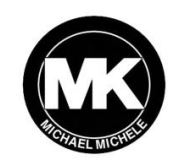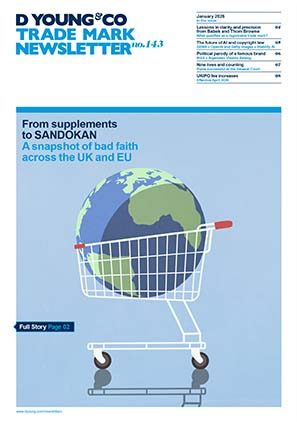Proving genuine use in the EU: Michael Kors v TECOM MASTER & adp Merkur v EUIPO
In September 2023 two decisions provided further guidance regarding proving genuine use of registered trade marks in the EU.
These decisions present a useful reminder and some important guidelines for brand owners, who may need to consider updating their trade mark portfolios to ensure their rights are enforceable.
In cancellation proceedings initiated by Michael Kors, the Board of Appeal of the EU Intellectual Property Office (EUIPO) has confirmed genuine use of Michael Kors’ registered word/figurative mark MK MICHAEL KORS for bags (class 18), clothing and shoes (class 25), shown below (figure 1).

Conversely, in opposition proceedings brought by adp Merkur GmbH against Play’n GO Marks ltd’s EU trade mark (EUTM) application for the mark GAME OF GLADIATORS, adp Merkur failed to show use of its mark “Gladiator”, registered for, inter alia, video games (class 9) and apparatus for games (class 28). This finding was upheld by the Board of Appeal and has now been confirmed by the General Court.
Registered mark and use variations seen as equivalents
Michael Kors submitted substantial evidence in an attempt to prove use of the aforementioned mark. Some of this evidence showed use of the mark in the form registered, but it also contained use of variations of the mark, either with additional elements, or with the element “MK” and/or the graphic stylisation omitted.
According to the Board of Appeal, the term MICHAEL KORS would be understood as a male forename and surname, which would be distinctive in relation to clothing, shoes or accessories. The letters MK would be perceived as a mere abbreviation of MICHAEL KORS.
When considering if a mark is being used in its registered form, one has to examine whether the variations alter the distinctive character of that mark. In essence, will consumers see the registered mark and the different use variations as equivalents?
In this case, the Board of Appeal decided that the following amendments did not alter the distinctive character of the registered mark MK MICHAEL KORS:
- the omission of the abbreviation MK or the specific stylisation of the registered mark, using only MICHAEL KORS;
- the addition of a simple geometric shape and a different layout (see figure 2 below);
- the inclusion of an additional word MICHAEL as a mere repetition of the male first name already contained in the registered mark;
- the different size of the word elements;
- the addition of further sub-brands, other marks or elements of Michael Kors; and
- the mark being used in different colours.

When a mark is composed of word and figurative elements, the word elements are, as a rule, considered to be more distinctive than the figurative elements. This is based on the general principle that the relevant public will be able to refer to the goods/services in question more easily by citing the word elements of the mark, rather than describing the figurative elements. In the Michael Kors’ case the figurative elements were almost imperceptible. Therefore, the use of these elements in different sizes, colours and/or layouts was not regarded as sufficient to alter the distinctive character of the registered mark.
However, this will not always be the case. When modernising word/figurative marks particular consideration must be given to amendments in colour, size or position, as this may necessitate new trade mark applications. Indeed, it is good practice, if budget permits, to try and seek protection for each variation of a mark in use.
Use as a trade mark
While it might seem obvious, parties invited to submit proof of use must take care to ensure that evidence submitted to show use of a mark actually contains the mark, and that it has been used as a trade mark. In adp Merkur’s case, it was held that the evidence submitted showed very limited use of its mark and, where it was used, it was generally among large numbers of other marks rendering the mark illegible or hardly legible. This also meant the mark was unlikely to be seen as an independent mark capable of denoting origin. Although adp Merkur argued that the Board of Appeal failed to take into account the norms of the sector, and had, for example, not properly considered applications for approval for gaming machines containing the “Gladiator” game, the court considered these had no evidential value. Indeed, those approvals were granted only for gambling devices, and not for specific games packages.
Extent of use
As regards proving the extent of use of a mark, the Board of Appeal reminds us in the Michael Kors’ case that it is not a requirement that the evidence provides the total sales figures under the mark in the relevant territory of sale. It is sufficient to submit evidence which shows that the minimum threshold for a finding of genuine use has been passed.
With regard to the minimum threshold for use, the General Court recaps in adp Merkur’s case that the purpose of the requirement for genuine use is not to assess the commercial success of a product or brand. Minimal use can be sufficient, provided that such use is regarded as warranted in the relevant economic sector as a means of maintaining or creating a market share for the goods/services protected by the mark. There is no de minimis rule, but, within the gaming sector, the General Court considered sales volumes by adp Merkur of approximately €2,500 to be insufficient. There were also question marks about how much of these low value sales could even be attributed to games bearing the “Gladiator(s)” mark.
In general, catalogues, affidavits, various printouts from the owner’s website, advertising material, social media, look books, turnover reports and invoices are admissible to prove use of a mark in the EU. Internal documents prepared by the interested party are also admissible, provided they are corroborated by additional solid evidence.
Indeed, in adp Merkur’s appeal the General Court re-enforced that although internal documents and sworn statements by individuals internal to the relevant party are, in principle, admissible in evidence, additional supporting material is required to corroborate such evidence. Although adp Merkur submitted a sworn statement from an employee and an internal table of sales figures, the General Court held that the Board of Appeal was correct to exclude this from its analysis of the evidence, as it was not possible to assess the accuracy of the information. The internal table also did not indicate the territory to which the sales related, nor which part of the turnover corresponded to the “Gladiator(s)” game.
Comment
These cases present two different outcomes with regard to proving genuine use. Nonetheless, the underlying principles are the same. Evidence submitted to show use of a mark should comprise more than token use of the mark, in the form registered, within the relevant period and within the relevant territory. Although variations in use of a mark may count as use of the registered form, it is best practice to obtain registrations for each variation in use. In this regard, brand owners might need to review and update their trade mark portfolios.
Furthermore, where submitted, internal evidence should be corroborated by third party sources. However, it is not uncommon for parties to hold ostensibly strong internal evidence which cannot be backed up by third party sources and it is likely this will continue to be a bone of contention.
In short
These cases serve as a useful reminder of the principles for assessing genuine use of a registered trade mark, and should prompt consideration of whether trade mark portfolios might need updating, particularly if brand owners may have difficulty in enforcing a mark due to a lack of use a) at all; and/or b) in the form registered.
Case details at a glance
Jurisdiction: European Union
Decision level: Boards of Appeal, EUIPO
Parties: Michael Kors (Switzerland) International GmbH v TECOM MASTER SL
Citation: R 1959/2021-1
Date: 04 September 2023
Case details at a glance
Jurisdiction: European Union
Decision level: General Court
Parties: adp Merkur GmbH v EUIPO (intervener: Play’n GO Marks ltd)
Citation: T-350/22
Date: 06 September 2023

